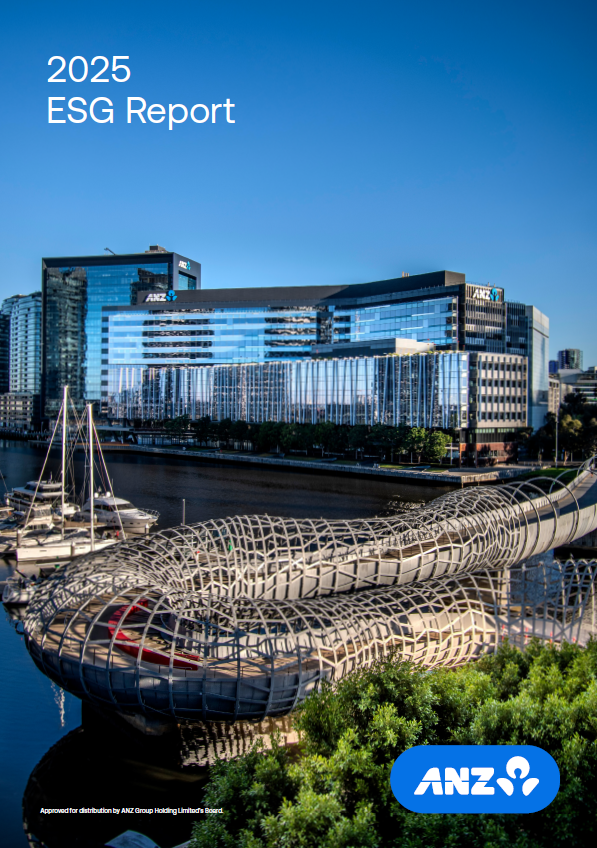Fraud protection.
Now it's personal.
ANZ Falcon® technology monitors millions of transactions every day to help keep you safe from fraud.
Falcon® is a registered trademark of Fair Issac Corporation.
Our suite of ESG reports are produced to meet the needs of our key external stakeholders, including our investors and customers, and take account of our social, environmental and economic risks and opportunities.
We're committed to transparent and regular performance reporting using key sustainability reporting frameworks, including the GRI Standards and TCFD.


This report provides stakeholders with detailed information on ANZ’s ESG performance and challenges. It includes performance against our ESG targets and our management of material ESG issues.
2025 ANZ ESG Data and Frameworks Pack
Our 2025 ESG Data and Frameworks Pack includes key ESG metrics and comparative performance data, and reporting against international standards and frameworks. Released 10 November 2025.
Our 2025 Climate Report outlines ANZ's approach and progress towards our Climate and Environment Strategy’s vision to finance a sustainable transition. Released 10 November 2025.
ANZ's Social and Environmental Sustainability Target Methodology. Updated 8 November 2024.
The Annual Report consists of our 2025 Operating and Financial Review, our Remuneration Report and the Financial Report. It descibes how we are aiming to create value for our stakeholders. Released 10 November 2025.
The 2025 Annual GHG Emissions and Carbon Offset Data Assurance Statement details our global carbon offset data, prepared by KPMG. Released 10 November 2025.
ESG and climate content disclosed in ANZ's full-year Investor Discussion Pack. Released 10 November 2025.
Transitioning our lending portfolio to net zero financed emissions by 2050 in line with the goals of the Paris Agreement: Our approach to Institutional energy customers. Released 10 November 2025.
Our Modern Slavery and Human Trafficking Statement covers the actions we have taken to identify, assess and manage modern slavery risks in our operations and supply chain during the 2024 financial year. Released March 2025.
The S&P CSA measures the ESG performance of companies. ANZ’s score is available via S&P Global Scores.
Sustainalytics' ESG Risk Ratings measure a company's exposure to industry-specific material ESG risks and how well a company is managing those risks. ANZ’s score is available via Sustainalytics ESG Risk Ratings.
In 2019 we became a founding signatory to the UN Principles for Responsible Banking. Under the Principles we are required to set at least two targets (located on page 18 and set out in our UN Principles for Responsible Banking Self-Assessment available here that address our most significant positive and negative impacts, aligned with the SDGs and the Paris Agreement.
We have reported our progress towards implementing the Principles using the Reporting and Self-assessment Index, available in our 2024 ESG Data and Frameworks Pack.
We became a signatory to the UN Global Compact in 2010. Each year we complete a “Communication on Progress” which details our approach to performance against the Compact’s 10 principles in the areas of human rights, labour, environment and anti-corruption.
ANZ joined the Net-Zero Banking Alliance (NZBA) in 2021, reflecting our commitment with other leading banks globally of transitioning our lending portfolio to net-zero financed emissions by 2050 in line with the goals of the Paris Agreement.
UNEP FI is a partnership between UNEP and the global financial sector to mobilise private sector finance for sustainable development. UNEP FI works with more than 350 members – banks, insurers, and investors to help accelerate sustainable finance. ANZ has been a member since 2003.
Since 2005, we've measured our community investment in accordance with the Business for Societal Impact (B4SI) Framework, a global standard for measuring and managing social impact. In 2024, our community investment was AUD $134.7 million. In addition, we facilitated more than AUD $18.3 million in donations to community organisations through our employees, customers, shareholders, other partners and the general public.
![]()
You need Adobe Reader to view PDF files. You can download Adobe Reader free of charge.